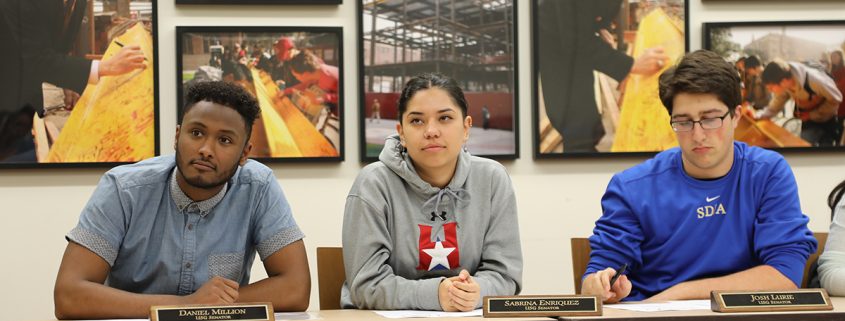Senator resigns from USG before presidential election
Undergraduate Student Government Senator and presidential candidate Daniel Million resigned from the Senate on Tuesday, citing what he said was a lack of inclusivity from the organization as well as unfair hiring practices and judicial processes.
Million was not present at the USG Senate meeting on Tuesday, though he had not announced his resignation publicly at the time. He explained that the biggest problem that he had with USG was the organization’s inability to make him feel welcome, especially as a student of color.
“In a meeting with some heads of USG, I stated that as one of the two black males of the organization, I sometimes felt like no one cares about the problems I’m facing,” Million said. “I’ve talked about the Black Lives Matter movement and unarmed black people being shot and how that impacts me. No one has listened, I don’t think anyone has cared.”
USG Vice President Austin Dunn, who oversees Senate meetings and has worked with Million in the past year, said that he made efforts to reach out to all senators by scheduling one-on-one meetings with them throughout the year. However, he said that Million never expressed any of the concerns he had about not feeling included in USG to him.
“That’s really hard to hear because there are many people at this organization that are fighting for people of all backgrounds and communities,” Dunn said. “Edwin and I can only control so much, and when people don’t bring issues forward and have a discussion with us, then there’s no way we can help. We can’t be in the minds of other students — all we can do is serve the people who are willing to speak up and have an open dialogue with us about the problems that are being had.”
Furthermore, Million said that he believed the hiring process in USG was tilted in the favor of people who had personal connections to current USG leaders, and that he no longer wanted to be part of an organization that chose its members in this way. If elected president, Million explained that inclusion and a non-biased hiring process would be a primary concern.
“I don’t want anybody to feel the way I did,” Million said. “As a delegate, I felt like I didn’t know people within the organization that were higher up and that I didn’t have a chance. I want every person on this campus to feel like they have an equal opportunity to get positions these positions.”
Dunn, however, explained that for USG appointments, the heads of most branches — communications, funding and program board — are chosen by the previous year’s leaders, a system that he emphasized was based on merit and not personal connections.
“As the vice president, I oversee the advocacy branch and the Senate, and I only directly hire the director of the advocacy branch,” Dunn said. “Experience within the organization, ideas for moving forward and passion are three things that I look for personally.”
While Million said he does “wholeheartedly respect” the work that USG does, especially that of the cultural assemblies, advocacy branch and program board, he explained that his participation in the election has led to his loss of faith in the organization’s ability to uphold rules. His ticket, Million-Vorhoff, filed a complaint against the Austin-Morgan campaign last week, accusing them of beginning their campaign the day before the start of the official campaign period. The Austin-Morgan ticket received four strikes — out of nine that would lead to disqualification — and was stripped of $1,000 out of its $1,500 campaign reimbursement. Million said that this punishment is not adequate and negatively impacts USG’s accountability and integrity.
“I feel like this sets a precedent that students in the future that have the resources to fund their own campaigns might as well seek this unfair advantage,” Million said. “People are going to take advantage of this ability. The members of the organization need to be held to a higher standard.”
However, Dunn said that he agreed with Million’s point, and had actually tried to address the problem himself.
“I was worried about a precedent being set where having money would allow you to break the rules,” Dunn said. “It’s really offensive to apply that to myself and Morgan’s campaign, because the moment I heard about the ruling, I went to the professional staff and asked if I could appeal. I did that because we were honest about the mistake that we made and wanted to be clear that it would never happen again.”
Million explained that despite his resignation, he wants to remain involved with USG by serving as its president, through which he hopes to make a lasting impact on the USC community.
“At the end of the day, what I want to be remembered for, regardless of if we win or lose this election, is that we’re fighting for the students,” Million said. “We want to make sure all the students know what’s going on this campus. We want to give students the opportunity to make an impact.”

